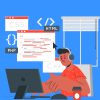Many of those who are involved in the web development environment know this term first hand. However, there are still many people who stay left in the dark when you ask them about what a framework is.
Choosing a proper software framework for your application affects the speed of the development, timelines, and your ability to scale in the future. Let see what exactly this concept is and what it means when programming.
What is a Framework?
A framework is a platform or structure for developing software applications where tasks are performed or completed. This is a foundation where software developers build programs for a specific platform.
Frameworks may include predefined classes and functions that developers use to manage hardware devices and interact with system software. They don’t need to discover continents each time they develop a new app because frameworks significantly streamline the development process.
We may compare a framework with an API (application programming interface), though technically a framework includes an API. Frameworks serve as a foundation for programming and APIs provide access to the elements supported by the framework.
Frameworks may contain a compiler, code libraries, and other programs used in the software development process. Usually, frameworks refer to an often-layered structure. It indicates what kind of programs can be built and how they would connect to each other.
A software framework is an abstraction where software can be selectively changed by additional user-written code and this provides the app with specific software.

Why do we use frameworks and what are their advantages?
Software development is objectively a complex process. This process requires a plethora of tasks, including coding, designing, and testing. Programmers should care about the syntax, statements, exceptions, garbage collection, and more.
Frameworks allow developers taking control of the entire software development process, providing them with the following advantages:
- Help to establish better programming practices and fitting use of design patterns.
- Help to avoid redundant code.
- Make code more secure.
- Assist to develop code with fewer bugs.
- Improve functionality.
- Simplify work on sophisticated technologies.
- Make applications more reliable.
- Reduce the time required to develop an app
What are the Benefits Frameworks Provide?
Frameworks feature numerous helpful tools that help developers get work done, not just quicker, but better. While every single software framework platform has its own unique features, they also provide some common benefits:
1. Easier coding
Coding can be a repetitive process and using frameworks simplifies it. This happens due to libraries of bundled code based on the parameters of the given programming language. You also save time and reduce the risk of code errors.
2. More secure data
Programmers are responsible for protecting data from cyberattacks when they are developing outside of a framework environment.
Reliable security software protects any frameworks. Therefore, this burden is taken off of the developer.
3. Open source code
Most software frameworks are open-source. It means that they have non-restrictive licensing, that allows programmers to create at the commercial level.
4. Integration across databases
Frameworks use APIs to connect with databases and third-party tools. Developers use them to increase efficiency in any programming setup.
5. Allowing more advanced tactics
All developers are good at thinking about technology from a big-picture point of view. However, it requires time to solve the problems at hand. Thanks to frameworks, they do not need to fret over semicolon placement or building their own APIs. They are able to visualize and orchestrate more advanced tactics.

Framework vs Library: what is the difference between them?
Some people assume that a framework is a set of libraries just as a library is a collection of precompiled routines. This is not true. Not all frameworks use or depend on libraries.
The difference is that the framework calls the code. And the code in its turn, calls the software library.
Programming language vs Frameworks: how do they differ?
Different programming languages tell the computer what it should do. Each language has a syntax and a range of rules that need to be followed every time the code is written. A framework is built on top of a programming language.
Types of Frameworks
Every developer strives to seek software frameworks that best suit their needs. Luckily, frameworks do exist for all genres of software programming.
There are many types of frameworks that make it easier to develop apps for a wide range of application development domains. Here are some most demanded of them:
Web application frameworks
- Angular – a typescript-based JS framework that helps in building applications on the web. It solves app development challenges by combining dependency injection, declarative templates, end-to-end tooling, and much more. Among the popular websites developed with AngularJS, you may find PayPal, Upwork, Netflix, YouTube, etc.
- Django – an open-source web application framework written in Python. This framework takes care of web development and lets developers focus on writing apps without reinventing the wheel. Many global organizations all over the world actively use Django. For example, Instagram, Pinterest, Disqus, Mozilla, and many more.
- Laravel – a PHP-based web application framework with an elegant syntax. It is powerful and easy to understand. Laravel has placed the position for the most powerful PHP framework. It offers a standardized and feature-packed platform for high-performing PHP web app development. World Walking, Alison.com, and Neighborhood Lender use Laravel for their needs.

Data science frameworks
- Apache Spark – an analytics engine for large-scale data processing. With the help of Apache Spark, developers can write apps quickly in Java, Python, Scala, R, and SQL.
- TensorFlow – an open-source framework for machine learning that has a flexible ecosystem of tools, libraries, and community resources. They all allow diving into machine learning as well as building and deploying powerful apps.
- PyTorch – another open-source machine learning framework that boosts the process from research and prototyping to production deployment. PyTorch can be used with Python as well as C++.
Mobile development frameworks
- Ionic – a free open-source mobile UI toolkit that assists programmers in developing high-quality, cross-platform native apps for Android, iOS, and the Web. Ionic is used for the whole application lifecycle that allows teams to build better and faster applications.
- Xamarin – an open-source app development platform for creating Android, iOS apps with .NET, and C#. This is part of the .NET platform.
- Flutter – a Google’s UI toolkit for building friendly and natively compiled apps for mobile, web, and desktop from a single codebase. Flutter has an expressive and flexible UI.
The bottom line
If you are a programmer striving to use software frameworks for app development, try to select a framework or a programming language based on the need for your application that is to be developed.
Do not hesitate to analyze areas such as cloud management, front-end, back-end, and mobile technology, and others, as well as to understand the technology features before deciding to sign up with one.
*All photos are used as illustrations (by Maxwell Nelson, Shahadat Rahman, Yack Capital, NESA. Pexels.com, Unsplash.com)





